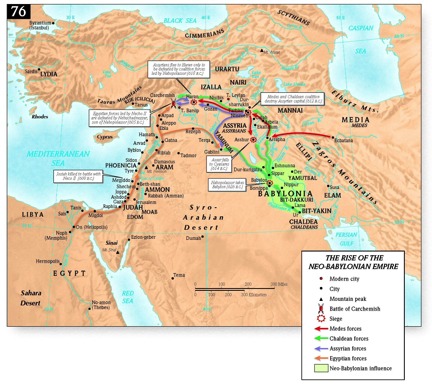The Story pt. 17: The Kingdom's Fall
![]()
To keep up with all notes from The Story and notes in Spanish, check out our Story page.
The Fall of Judah and the Prophet Jeremiah
In The Story we come to chapter 17 or 2 Kings 21. God made promises to Abraham and Moses the he would show his love to all people and call them back to himself. To David, God promised to bring the Messiah. Even though God’s people fail to obey, and the kingdom split into two smaller, weaker nations, God will fulfill his unconditional promises. The northern kingdom, Israel, went into exile to Assyria in 722 B.C. What happened to the southern kingdom of Judah? Turn to 2 Kings 21:1. While you are headed there let’s tune into the History Chanel so we can get a little background.
Historical Background
- Assyrian army returns to Nineveh after God intervenes on behalf of Hezekiah in protecting Jerusalem.
- Sennacherib, king of Assyria is killed by one of his sons in 681 B.C.
- Assyria is dominant under Esarhaddon (681-669 B.C.) & Ashurbanipal (690-664
B.C.) - Assyrian conquest of Egypt 667-663 B.C.
- Babylon begins to rise as the Medes press Nineveh from the east and the Chaldeans
push from the south. Egypt allies with Assyria fearing the strength of joint Mede-
Persian empire. - Nineveh falls in 612 B.C. (see Nahum 1:15-3:19)
- Egypt retained control of International Coastal Highway with garrisons at Riblah
(cetnral Syria) and Carchemis (west bank of the Euphrates). They also controlled cities of the Philistine Plain and also Megiddo where Josiah died fighting Neco, king of Egypt in 609 B.C. (2 Kings 23:28-30) - Final showdown between Egypt and Babylon at Carchemish in 605 B.C. (See Jeremiah 46). Nebuchadnezzar wins the battle and subsequently assumes the throne of a new empire: the Neo-Babylonian Empire.
- The fate of Palestine (Judah) had been sealed.
- Lays siege to Jerusalem twice 598/597; 587.586 B.C. (See Jeremiah 39)
- Evil Meroduk reigns and frees Jehoiachin, king of Judah (2 Kings 25:27-30)
A. Manneseh Son of Hezekiah
- Came to the throne at the age of 12
- Did not follow in the ways of his father, instead he did evil, big time. (2
Kings 21:1-16) - The great prophet Isaiah was sawn in two under this king’s leadership.
- Led the people into more evil than the people whom God had destroyed
before Israel (2 Chronicles 33:9) - God finally gets Mannaseh’s attention (2 Chronicles 33:10-17)
- Became king when he was 8 years old.
- Began reforms and restoration of the Temple.
- During the 12th year of his reign The Book of the Law was found in the
Temple as it was being restored. Josiah was invigorated by this revelations and renewed the much of the covenant with God. Passover was reinstated for the first time since the Judges. - Josiah expanded his influence as he purged many of the ‘high places’ of idolatry that was set up in the northern territories.
- Demolished the high place made by Jeroboam fulfilling the prophecy made 300 years before.
- Because of Josiah’s faithfulness God promised not to execute judgment upon Israel in his lifetime.
C. God cannot continue to bless Judah because it would send a confusing message to Judah and to the surrounding nations.
D. God warns Judah of exile, yet through Ezekiel the prophet, God promises to fulfill his purpose that all nations will know God. Ezekiel 36:23
The express purpose of God in his relationship with Israel is always to demonstrate that he is the one true God who wants people to come back into relationship with him.
- God raises up the Babylonians to judge the southern kingdom—sinful Judah.
A. The Babylonians conquered the Assyrians and destroyed Jerusalem and Judah in 586 B.C. taking prisoners into exile.
B. The fall of the northern kingdom and southern kingdom are hard stories but they teach us valuable lessons of faith.
C. In the midst of judgment God always offers a promise of hope. - God calls Jeremiah to be the “weeping prophet” over Judah and its fall.
A. God calls Jeremiah while Jeremiah is still in the womb! Jeremiah 1:4-5
B. Jeremiah made excuses to God that he was not qualified (Jeremiah 1:9-10) But God promises to help Jeremiah speak and God will be with Jeremiah.
Application: God gives us his Holy Spirit to help us fulfill our role. Jesus promised to be “with us” to the end of the age. Matthew 29:18-20
C. Jeremiah’s task to call people back, but he will fail, both weeping over Judah’s destruction and offering hope for the future.
Application:
1. Jeremiah’s “weeping” is recorded in the Book of Lamentations.
2. Jeremiah’s hope is written in Lamentations 3:21-23 “Great is thy faithfulness.”
Jeremiah moments come to all of us. Will you accept God’s call upon your life?



